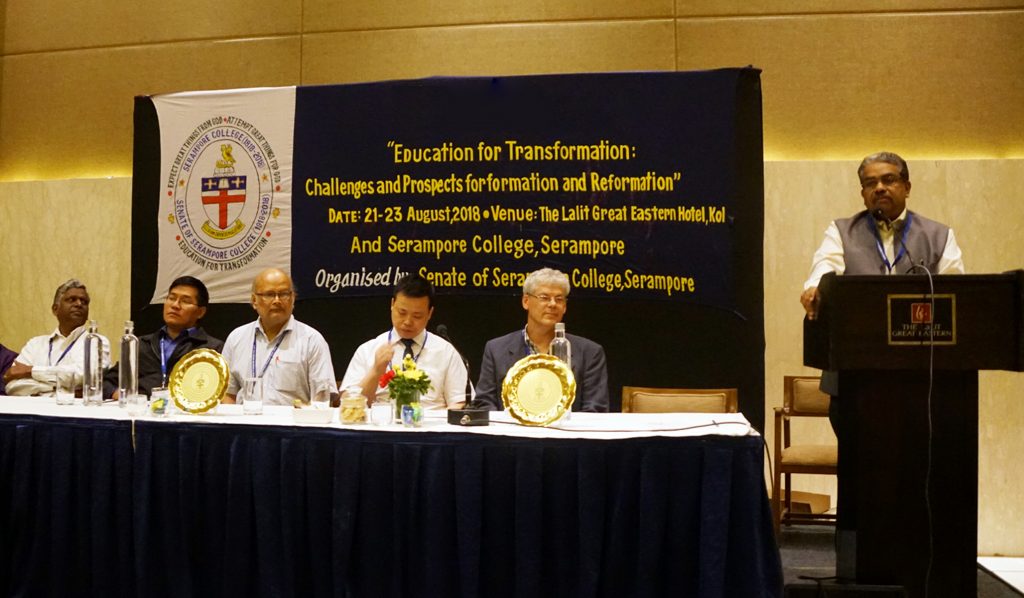The legacy and commitment of the Senate of Serampore College (University) unparalleled, says CCA General Secretary

“The legacy and contribution of the Serampore College and the Senate of Serampore (University) over the past two centuries in nurturing theological education and ecumenical formation are unparalleled in Asia,” stated the General Secretary of the Christian Conference of Asia (CCA) Dr. Mathews George Chunakara.
While extending CCA’s felicitation and greetings during the commemoration of the bi-centenary of India’s first theological institution to have the status of a university, the CCA General Secretary said, “Adequate freedom and space to initiate courageous and creative theological thinking is still lacking in many Asian churches. Churches in several parts of Asia are not in a position to integrate new theological thinking into the life and ministry of churches. In this situation, Senate of Serampore must take a lead in initiating new ways to nurture authentic Asian theological thinking that is more real to the life and witness of Churches”.
The CCA General Secretary further added, “The theological education in Asia has by and large gained ascendency and legitimacy as predominantly Western ;there is a clear void in ensuring unique Asian or Indian theological identity. Churches, theological institutions and theological educators in Asia still look for Western theological models; Asian theologians and educators prefer to pursue their advanced theological education in the West and yet, they use rhetoric to prove their distaste to the theology of the West”.
“Theology that reinforces mutual solidarity within Asia can assert real Asian identity, sense of belonging and ownership. Theology and theological education that help to develop creative and theological insights out of the Asian experience only would gain legitimacy as a predominantly Asian theology in a pluralistic Asian context”, said Dr. Mathews George Chunakara. The CCA General Secretary suggested that the Senate of Serampore should take initiatives to extend theological education facilities and share the rich theological resources in India with other Asian churches that continue to lag behind in developing proper theological education facilities.
A special thanksgiving service held at the St Paul’s Cathedral in Kolkata was attended by special invitees and international ecumenical guests.
In the thanksgiving service address and bi-centenary message delivered at the historic St. Paul’s Cathedral, the Chancellor (Master) of the Senate of Serampore, Bishop Dr. John S. Sadananda said, “The Senate of Serampore has been involved in ministerial formation for all God’ people. Viable ministerial formation is for humanity and all God’s people. We emphasise the essential unity of the laity and the clergy as the ministers of God together making up the Laos, the people of God. The blending of ecclesiological commitment and ecumenical ministerial formation is essential for our being the Church in the world”.
Bishop Sadananda highlighted how the Senate of Serampore taught that Christian life and spirituality can be lived pluralistically even as religious life in the country had always been pluralistic both in vision and reality.
The Chancellor emphasised, “Theological education and theological educators do not exist apart from the Church and people of God; they are within Church’s life of worship and witness. But the special character of the theological education as a vital and integral ministry of the Church is to be recognised, respected and owned by the Church”.
Bishop Sadananda further said, “In a context of growing religious fundamentalism at different levels, our task is to heal the brokenness together with all like-minded, life-affirming, peace-making people for the furtherance of God’s reign in our times”.
The Serampore College was founded in 1818 by the Baptist missionaries William Carey, Joshua Marshman and William Ward, and eventually became the only university for theological education in India. Today it has 59 affiliated theological colleges and seminaries of Protestant, Orthodox, Mar Thoma, Pentecostal and other independent churches in South Asia.










